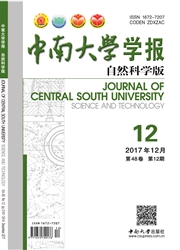

 中文摘要:
中文摘要:
The effect of ultraviolet mutagenesis on a heterotrophic strain (Providencia JAT-1) mutation was studied and bioleaching of low grade copper ore with mutant bacteria was investigated. The results show that the activity of bacteria was improved after ultraviolet mutagenesis; the best irradiation time was 120 s. Compared to the original bacteria, the cells density of mutant bacteria at stationary phase increased by 26% and ammonia produced by mutant bacteria increased by 12%. Higher activity of bacteria leads to a higher copper extraction rate. The bioleaching performance of Providencia JAT-1 was improved after UV mutagenesis. The copper extraction rate with mutant bacteria increased by 10.6% compared to the original bacteria. The ore surface was corroded and the fine particles were absent after bioleaching. Free copper oxide and copper silicates could be leached out easily by using JAT-1; a small part of the copper sulfide can also be leached out. Bioleaching using JAT-1 is more effective than ammonia leaching and copper extraction rate with mutant bacteria was 21.1% higher than that by ammonia leaching under the same condition.
 同期刊论文项目
同期刊论文项目
 同项目期刊论文
同项目期刊论文
 期刊信息
期刊信息
